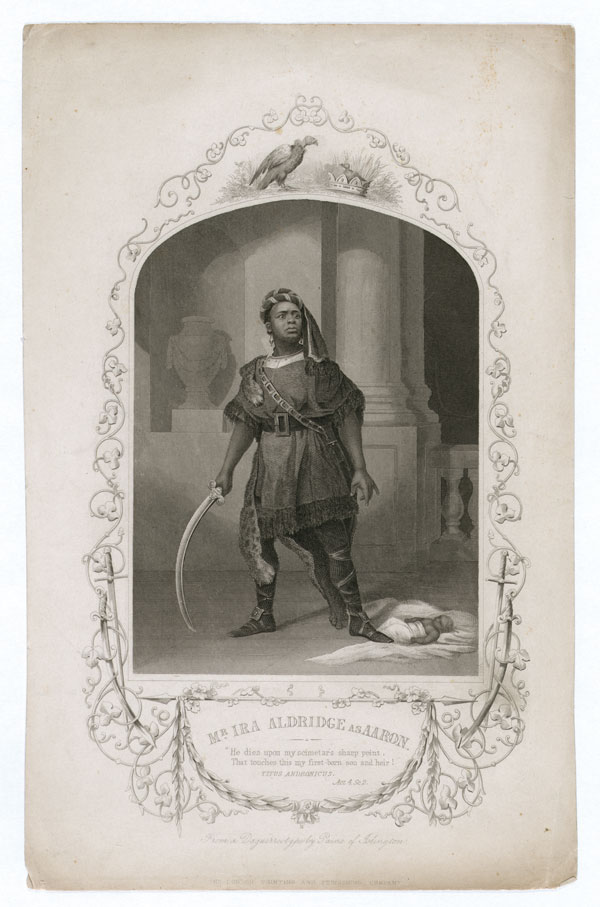Nancy Prince had to go to Russia to live out a classic American rags-to-riches story. A free black woman from Massachusetts, she struggled with racism and poverty. So in 1824, the 24-year-old sailed for St. Petersburg, joining her new husband who served in the imperial court. Soon Prince found herself meeting the czar and czarina in the palace’s gilded halls. She also became a successful entrepreneur and philanthropist, making baby clothing with the help of several employees and founding an orphanage.
 An engraving from the mid-1800s depicts Ira Aldridge as Aaron in Shakespeare’s Titus Andronicus.As a graduate student in Georgia, Jessie Dunbar, Ph.D., was surprised to read Prince’s narrative. She was even more surprised to learn that Prince was among several Africans and African Americans migrating to 19th-century Russia. “It’s common knowledge that communism attracted black people to Soviet Russia,” explains Dunbar, assistant professor in the UAB College of Arts and Sciences Department of English. “But it never occurred to me that czarist Russia was on their radar.”
An engraving from the mid-1800s depicts Ira Aldridge as Aaron in Shakespeare’s Titus Andronicus.As a graduate student in Georgia, Jessie Dunbar, Ph.D., was surprised to read Prince’s narrative. She was even more surprised to learn that Prince was among several Africans and African Americans migrating to 19th-century Russia. “It’s common knowledge that communism attracted black people to Soviet Russia,” explains Dunbar, assistant professor in the UAB College of Arts and Sciences Department of English. “But it never occurred to me that czarist Russia was on their radar.”
Free to succeed
Today Dunbar specializes in literature of the African Diaspora from the past two centuries. Her research covers topics ranging from the Afro-Cuban experience to the 1960s-1970s Black Arts Movement to the evolution of hip hop. But first, she had to find out why Russia appealed to black travelers more than a century ago.
The investigation fueled her dissertation and, after her arrival at UAB in 2013, a course on cultural and literary exchanges between African Americans and Russians. Last year, Dunbar’s work earned a Career Enhancement Fellowship from the Woodrow Wilson Foundation. The six-month fellowship, supporting junior minority faculty at universities nationwide, provided a mentor and resources to further Dunbar’s research.
The first, perhaps most obvious reason why black people went to Russia is that the country wasn’t part of the African slave trade, Dunbar says. There, they were free men and women. They also didn’t worry about being marginalized, thanks in part to Peter the Great, Dunbar notes.
The 17th-century czar reformed the aristocracy’s “caste system” so that work and service, rather than birth, determined the nobility’s rank, Dunbar says. To prove the new system’s worth, Peter adopted a young slave boy named Hannibal as his godson. “He basically says, ‘I’m going to take this black man from savage Africa, and if he can rise through the ranks, then so can you,’” she explains. “It’s incredibly racist, but it opened up opportunities for black people, which is alarming and surprising.” Hannibal eventually did become a nobleman—and an army general, governor, and military engineer. (His great-grandson is the famed poet Alexander Pushkin.)
Others followed Hannibal and Prince. Nicholas Said, a native of Africa who became enslaved and sold into the Ottoman Empire, was brought to St. Petersburg by a nobleman. There he learned Russian (one of seven languages he knew); freely explored the city’s galleries, theaters, and other attractions; and even received a gift of 50 silver rubles from the czar. Black entertainers also found acclaim. The New York Shakespearean actor Ira Aldridge began his career on American and British stages, but he packed houses in Russia, where he mingled with key artists, actors, and writers. Russia wasn’t a perfect utopia for black people, Dunbar explains, but compared to the United States of the 1800s, it seemed like paradise.

Inspired to act
Success and societal freedom weren’t enough to make their moves permanent, however. Why did some black people leave? “You go into exile because of the way you’re treated at home, but you can still miss it,” Dunbar says. Prince, for example, a devout Protestant, never felt comfortable with the Russian Orthodox Church.
 Jessie Dunbar, Ph.D.More important, many black people hoped to transform their home countries after experiencing a different kind of treatment in Russia, Dunbar says. After nine years, Prince returned to America, where she opened another orphanage, joined an anti-slavery organization, and journeyed to Jamaica to teach and minister to former slaves. Said intended to go back to Africa but became a teacher in south Alabama. Aldridge, who spoke out against slavery to his audiences, planned to come home to the United States after the Civil War but died before he was able. Jessie Dunbar earned a prestigious fellowship from the Woodrow Wilson Foundation to further her research into black and Russian history.
Jessie Dunbar, Ph.D.More important, many black people hoped to transform their home countries after experiencing a different kind of treatment in Russia, Dunbar says. After nine years, Prince returned to America, where she opened another orphanage, joined an anti-slavery organization, and journeyed to Jamaica to teach and minister to former slaves. Said intended to go back to Africa but became a teacher in south Alabama. Aldridge, who spoke out against slavery to his audiences, planned to come home to the United States after the Civil War but died before he was able. Jessie Dunbar earned a prestigious fellowship from the Woodrow Wilson Foundation to further her research into black and Russian history.
These travelers left behind a cultural and political legacy, Dunbar says. “The Russian concept of ‘soul’ is similar to what black people refer to as ‘soul,'” she explains. Other researchers have noticed this, highlighting similarities between Russian and black literature. “Ralph Ellison’s novel Invisible Man borrows heavily from Fyodor Dostoevsky’s novella Notes from Underground,” Dunbar says. “These two different cultures separated by oceans have a similar approach, ideology, and thought process.” Both have been marginalized throughout history, labeled as uncivilized and backward, she adds. As a result, both literatures “are heavily influenced by western European views of them.”
Encounters between African Americans and Russian intellectuals also may have nudged the country closer to the 1917 revolution leading to the Soviet Union’s birth, Dunbar notes. Discussions of American slavery and the Civil War resonated with Russians wanting constitutional change and an end to the oppressive system of serfdom. They paid close attention to the insights and activism of African Americans, she says.
Travelers, activists, trailblazers
Dunbar, who is writing a book based on her research, says students in her course respond to the material enthusiastically, which she finds encouraging. Sharing the stories of Prince and other expatriates helps to provide a more nuanced understanding of black history.
“Black people weren’t just slaves in the 18th and 19th centuries,” Dunbar explains. “They were travelers and activists. We need to see the whole picture.”